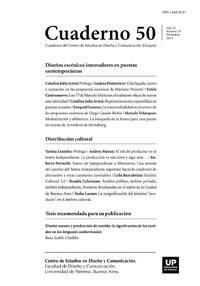Lote 77, de Marcelo Mininno: el trabajoso oficio de narrar una identidad
Abstract
The paper aims to investigate about the construction of identity narratives,
especially in the show Lot 77, written and directed by Marcelo Mininno, and premiered in
the city of Buenos Aires in 2008.
I foster to the notion of “narrative identity”, as presented by the researcher, specializing in
postcolonial studies, Kwame Anthony Appiah, in his book The Ethics of Identity. The author states that historically two identity versions have been confronted: the individual and
/or collective and the essentialist one, which considers identity as something given, that
it´s necessary to find to build our own lives, and a existentialist version, as which existence
precedes essence: first comes into existence, then you need to decide (and build) how what
to exist. Appiah believes that both notions are wrong, you need to be located somewhere
in the middle: the identity is constructed dialogically, in interaction with those materials
provided by the social environment and its institutions. On the other hand, the author
fosters to a narrative conception of identity, which take the form of narratives, stories,
“scripts” that people use to shape their projects and to tell their own life stories.
References
Bayardo, R. (septiembre de 2002). Antropología, identidad y políticas culturales, Boletín Virtual NAyA. Disponible en: http://www.naya.org.ar/articulos/identi01/htm.
Jelin, E. (2001). “Las memorias en las calles y en la acción. Espacios de lucha por los derechos humanos”, en AAVV: Memorias, identidades e imaginarios sociales. Gobierno de la Ciudad de Buenos Aires, Secretaría de Cultura, pp. 169 - 187.
Appia, K. A. (2007). La ética de la identidad. Buenos Aires: Katz Editores.
Candau, J. (2001). Memoria e identidad. Buenos Aires: Ediciones del Sol.
Bauman, Z. (2005). Identidad. Madrid: Losada.
Los autores/as que publiquen en esta revista ceden los derechos de autor y de publicación a "Cuadernos del Centro de Estudios de Diseño y Comunicación", Aceptando el registro de su trabajo bajo una licencia de atribución de Creative Commons, que permite a terceros utilizar lo publicado siempre que de el crédito pertinente a los autores y a esta revista.


